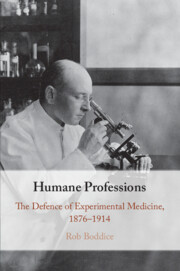Book contents
- Humane Professions
- Humane Professions
- Copyright page
- Dedication
- Contents
- Illustrations
- Acknowledgements
- Introduction: Experior
- 1 Darwin’s Compromise
- 2 Medical Monsters?
- 3 Of Laboratories and Legislatures
- 4 Paget’s Public
- 5 Cannon Fire
- Epilogue: Humanity and Human Experimentation
- Select Bibliography
- Index
4 - Paget’s Public
Published online by Cambridge University Press: 22 January 2021
- Humane Professions
- Humane Professions
- Copyright page
- Dedication
- Contents
- Illustrations
- Acknowledgements
- Introduction: Experior
- 1 Darwin’s Compromise
- 2 Medical Monsters?
- 3 Of Laboratories and Legislatures
- 4 Paget’s Public
- 5 Cannon Fire
- Epilogue: Humanity and Human Experimentation
- Select Bibliography
- Index
Summary
The medical-scientific establishment’s approach to the Second Royal Commission on vivisection was brilliantly contrived to ensure success before Parliament. But insofar as they set out to persuade Parliament to let sleeping dogs lie and be cut, a clear need to win over public support to the cause had re-emerged. Even if the medical community could easily sway a public enquiry, it nevertheless took a great deal of energy, time and money. Ernest Starling and his peers across the research community would have much preferred to be left alone to get on with their jobs. Thus, a whole new communication strategy had to be carved out, so that scientists might get their message across to polite society, and from there to the population at large. The coordination of this strategy was also better handled by parties beyond the world of scientific practice, lest this too drain the energy of medical research and divert its attention to the detriment of the pursuit of knowledge. Hence the need for the Research Defence Society, founded in 1908 and led by Stephen Paget.
Keywords
Information
- Type
- Chapter
- Information
- Humane ProfessionsThe Defence of Experimental Medicine, 1876–1914, pp. 103 - 137Publisher: Cambridge University PressPrint publication year: 2021
